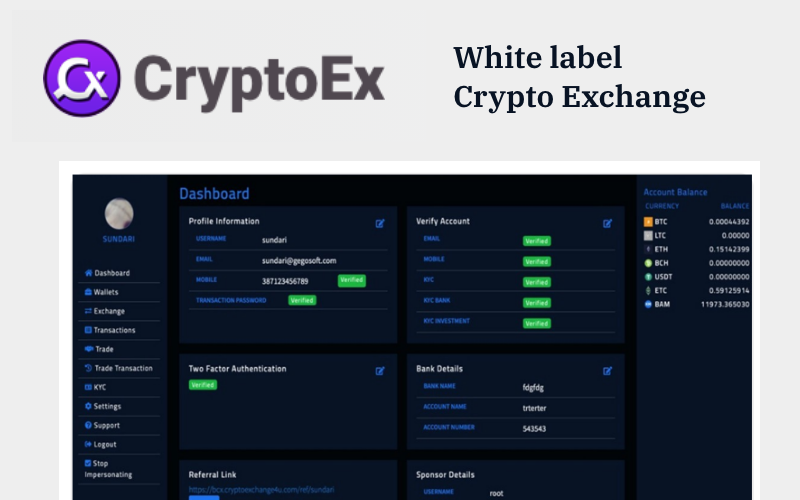What is a White-Label Crypto Exchange?
A white-label crypto exchange is a pre-built software solution developed by one company and can be rebranded and used by another. It allows businesses to launch their own cryptocurrency exchange with custom branding and features, tailored to their specific needs.
How Does a White-Label Crypto Exchange Work?
This exchange operates by providing a customizable software solution, delivered as source code. Clients install it on their servers, adapting it with features like multi-currency support, user-friendly interfaces, security measures, liquidity options, payment gateway integration, customer support, and compliance with regulations.
Benefits of a White-Label Crypto Exchange
White-label crypto exchanges are cost-effective and time-saving, allowing businesses to quickly enter the cryptocurrency market. They offer customization, proven reliability, built-in security and compliance, and require less technical expertise. These platforms are scalable, market-ready, come with technical support, and can integrate with various tools and services.
Key Factors to Consider When Choosing a White-Label
Security Features
Given the sensitivity of financial transactions, the chosen platform must have robust security measures like two-factor authentication (2FA), encryption, anti-money laundering (AML) protocols, and protection against various cyber threats.
Compliance with Regulations
Ensure the platform is compliant with relevant regulatory standards (like KYC, GDPR, etc.) in the jurisdictions you plan to operate. This is critical for legal operation and user trust.
Customization Options:
The ability to customize the platform according to your branding and specific business requirements (such as user interface design, feature set, etc.) is essential for differentiation and user experience.
Scalability:
The platform should be scalable to handle growing numbers of users and transactions without performance issues, ensuring it can grow with your business.
Liquidity Management:
Look for solutions that offer integrated liquidity, either through built-in liquidity pools or through partnerships, to ensure a smooth trading experience.
User Interface and Experience:
The platform should have an intuitive and user-friendly interface to ensure that it is accessible to users of varying expertise levels.
Technical Support and Maintenance:
Reliable and timely technical support from the provider is crucial, especially for resolving issues quickly and ensuring continuous operation.
Integration Capabilities:
Check for the ability to integrate with various payment gateways, wallets, and other third-party services and tools that you might require.
Performance and Reliability:
Evaluate the platform’s performance history in terms of uptime, speed of transactions, and overall reliability.
Feature Set:
Look for essential features like multi-currency support, order matching engine, automated trading, reporting tools, and others that are crucial for a crypto exchange.
Cost Structure:
Understand the pricing model, including initial setup fees, monthly or annual licensing fees, and any additional costs for customization or extra services.
Mobile Compatibility:
In today’s mobile-first world, ensure the platform is optimized for mobile devices, possibly with a dedicated app.
Future-Proofing:
The platform should be adaptable to future technological advancements and market changes, including the potential integration of new cryptocurrencies or features.
Evaluating these factors thoroughly will help in selecting a white-label crypto exchange solution that is secure, compliant, and aligns with your business objectives
















